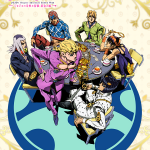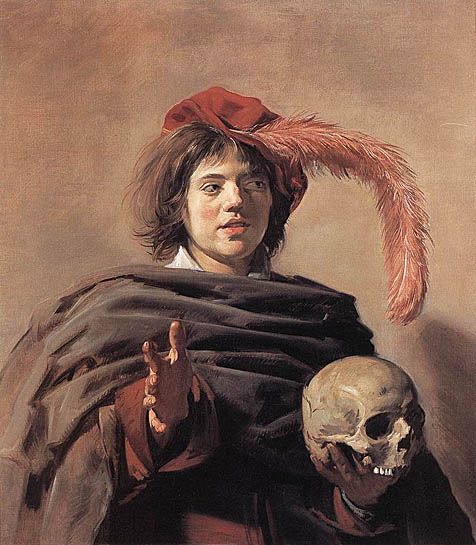
Bucciarati’s Gang
The following text contains spoilers for JoJo’s Bizarre Adventure: Golden Wind
The fifth part of JoJo’s Bizarre Adventure, “Golden Wind”, written by mangaka Hirohiko Araki, introduced us to the fictional Italian Mafia known as Passione. Full of superpowered young men with impeccable fashion sense, Golden Wind specifically focuses on the branch in Naples, led by paternal Capo Bruno Bucciarati. Each member of Bucciarati’s gang led tragic lives prior to their entry; the gang members are each other’s found family, they have become best friends thanks to their shared uplifting from the gang. Leone Abbacchio is no exception; unfortunately, however, he is one of the most misunderstood characters by the fanbase.
Leone Abbacchio is a tall, lipstick-wearing goth. He is bitter and melancholic—a contrast from the other, more lively members of the gang. Although he does not often participate in their antics, he is not completely devoid of joy; in fact, his introductory scene shows him urinating into some tea and tricking main protagonist Giorno Giovanna into drinking it. This shows that he does indeed have a sense of humor, albeit one that is somewhat sadistic. In particular, Abbacchio bears some content for the idealistic Giorno, mistrusting him when he first joins the gang. Having turned 21 just before the events of Golden Wind, Abbacchio is the oldest member of Bucciarati’s gang (even older than Bucciarati himself). However, his mature demeanor makes it easy for the average viewer to assume he is older. Although Abbacchio has depth as a character, fans often overlook this in favor of exaggerating his contempt for Giorno, which does a great disservice to his character.
Ironic as it may seem, Abbacchio is actually a former police officer. Shortly after graduating high school, he pursued his lifelong dream and joined the police force. Unfortunately, his passion for justice slowly faded as he learned the harsh truths of his line of work, and he quickly became jaded as a result. If a criminal had enough money, they could easily pay their way out of trouble and return to the streets. Through that, the effort of arresting and charging a criminal was effectively rendered a waste of time. Under this mindset, Abbacchio took a bribe from a criminal on the job.
This later came back to haunt Abbacchio. One fateful evening, he and a fellow officer were called to the scene of a store robbery. The store owner had been shot to death, and the perpetrator was none other than the criminal Abbacchio had taken the bribe from. Threatening to oust Abbacchio as a dirty cop if he were to be arrested, the criminal shot the other officer as Abbacchio watched in horror.
Abbacchio was exposed anyway, and fired from the police force as a result. He fell into a deep depression, wracked with guilt over letting his partner die. For a while, the young man spent his days holed up in his apartment, dependent on alcohol. That is, until Bruno Bucciarati paid him a visit and asked him to join his gang. As it turns out, turning to a life of crime is what ended up saving Abbacchio from himself. Abbachio’s character is grounded in this duality; his suppressed craving for justice and his sense of self-preservation. Due to his encounter with Bucciarati, Abbacchio not only bears a great amount of respect for the younger man, but is also only able to feel at peace when he is around, admitting this when the gang betrays the boss.
In the JoJo universe, many characters have superpowers known as Stands. Stands are a manifestation of one’s fighting spirit, and often reflect aspects of the user’s personality. Abbacchio’s Stand, Moody Blues, was given to him upon joining Passione; prior to this, he was just an ordinary guy. Moody Blues can reenact events that occured in a given location from any given time. This is highly useful for discovering the truth behind mysteries; this represents Abbacchio’s sense of justice. However, it also represents how he lives in the past, haunted by guilt, replaying the events of that fateful night over and over again in his mind.
As stated before, Abbacchio is somewhat antagonistic toward newcomer Giorno; however, it is inaccurate to say that he hates Giorno. Fans of the series have often boiled down his character to this singular one-sided relationship, often at the expense of Abbacchio himself Although his judgement of Giorno isn’t accurate, it is understandable why he would feel this way. Being in a gang is obviously highly dangerous, and members of Passione quickly learn to accept that they will probably die at a young age. Because of the odd reality of Stands, anything has the potential to be an aggressor more than capable of doing significant damage. As such, it is only natural that Abbacchio would be suspicious of Giorno. Furthermore, Giorno is highly idealistic in a world where dreams are often misguided. Not only does Abbacchio find this immature, but he also harbors some jealousy because he sees part of his younger self in Giorno. Abbacchio knows very well where his own idealism led him, so he feels it is unfair that Giorno has not been made to face a cruel punishment for his sense of justice.
Leone Abbacchio is a character with depth that is often ignored by readers of Golden Wind, and this depth is made most apparent following his one-sided encounter with the main antagonistic Stand of the part, King Crimson. During a routine mission, Abbacchio falls victim to a lapse of paranoia; he exposes himself to an attack through a momentary act of kindness. This act proves that his earlier coldness is at worst a breakable mask. Sustaining a fatal wound from the attack, Abbacchio fades away before anything can be done to save him. Using the last bit of his power, he was able to help the gang discover the secretive main villain Diavolo’s identity by using Moody Blues to replay a moment from 15 years prior and imprinting his face onto a large stone. Abbacchio’s final thoughts are not of self-preservation, but of completing his mission and supporting his team.
Abbacchio is a highly valued member of the gang, and his death serves as a turning point for both Bucciarati’s team and the story as a whole. While the rest of the team is forced to quickly mourn and move on from the attack, Abbacchio instead completes his character development as he fades away. Encountering the partner that was killed years ago, Abbacchio learns from the man that in his search for justice with Bucciarati, he has redeemed himself for his past mistakes. While an afterlife is present within the series, it can also be interpreted as Abbacchio finally forgiving himself for his mistakes. At this point, he finally breaks his gruff facade to openly cry as he realizes what has happened and moves on to the next realm.
Abbacchio serves as a guiding presence for the team throughout the rest of the narrative, his influence maintained even after his death. It is this development that pushes him beyond the simplification of his hatred for Giorno, and into a morally complex character who is worthy of analysis.



